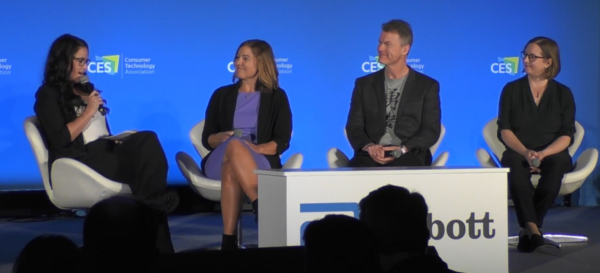In line with CES’s broad theme of human security for all, Abbott’s session on the future of at-home testing and diagnostics at CES 2023 revealed the current status of home diagnostics and its potential in the coming years in Las Vegas, the U.S. on Friday.

Cara Santa Maria, Science Communicator at Talk Nerdy, moderated the session with panelists Dr. Andrea Bonior, Clinical Psychologist and Consultant at Abbott, Dr. Bruce McCabe, The Global Futurist at S2 Intelligence Party, and Dr. Mary Rodgers, Research Manager at Abbott.
McCabe kicked off the discussion with a list of exciting home-based diagnostic applications such as CRIPSR-based diagnostics, Wifi waves bouncing off the water in people’s bodies to monitor gait, breathing, and heart rate, hypersensitive olfactory biomarkers for cancer or neurodegenerative diseases and diagnostic multiplexing for up to four or five conditions.
He went on to say, “AI and machine learning are playing an increasing role in enabling unobtrusive diagnostics at home, using thermal cameras or voice biomarkers to diagnose voice intonations and patterns for neurodegenerative diseases.”
Dr. Rodgers, who leads the viral surveillance program of Abbott’s Pandemic Defense Coalition, is collaborating with 20 different partners to find new pathogens and variants to quickly create prototype tests with faster responses.
Presenting the mental health perspective, Dr. Bonior explained, “Home tests can empower individuals and remove the uncertainties of insurance coverage which can be drivers of anxiety and the opportunity for these tests lies in simplifying test procedures with clear results.”
McCabe also noted that based on the complexity of the test, counseling and education also need to be considered.
Addressing concerns about at-home tests disengaging individuals from the greater healthcare system, Dr. Rodgers, said it was the opposite.
“I think these tests provide the insights for more to seek the specific care they need."
However, not every diagnostic might benefit from in-home tests. For example, receiving a cancer diagnosis at home can be difficult to process at home. On the other hand, home-based tests for HIV tests can help to reduce the stigma and get more missed diagnoses, she pointed out.
She added that some tests might be better with a hybrid approach combining a pharmacy or hospital with the diagnostic result.
McCabe referenced a study where an app in Hungary to diagnose skin disease was integrated into the healthcare system. This increased healthcare engagement, speed of service, and reduced costs.
Bonior said, “Rapid tests enable democratized health care, making it more informative and with less red tape but making sure that it is accurate to gain the trust of consumers.”
She also noted that privacy concerns should not be overlooked and need to clearly define what happens with results, who gets to see them, and the retention period for samples that are taken at home but sent to a lab for processing.
This also filters into the shareability of data which is healthcare’s greatest challenge, said McCabe.
Related articles
- [CES 2023] KBR’s pick: best digital health rookies
- [CES 2023] New policies to shape healthcare AI innovations this year
- SK Biopharmaceuticals’ epilepsy glasses featured at CES 2023 tech trends to watch
- [CES 2023] ‘Be In It -- I Am in IT (Information Technology)’
- EDGC to launch urinary diagnostic for home-based healthcare

